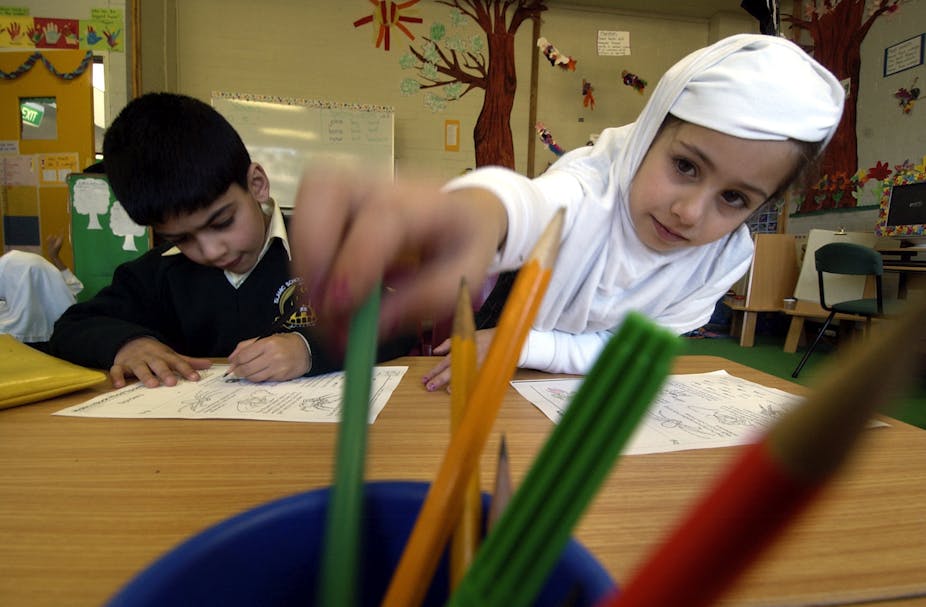Australia has an unusually high proportion of children enrolled in non-government schools, when compared to similar nations. This dates back to the struggles between colonial governments and Catholic bishops in the second half of the nineteenth century when government school systems were being assembled.
But the schooling landscape of the twenty-first century has less to do with religious affiliation than with choice. For certain sectors of society the process of choosing the “right” schools for one’s children has become a staple of the parenting conversation.
Further, school choice is not just about individual families but has a rather large policy footprint. The well-publicised Gonski review into the federal funding of schools is due to report at the end of this year. Over the past couple of years the implementation of the MySchool website has been one of the centrepieces of the federal government’s Education Revolution.
Let the market decide
School choice is underpinned by a set of market theories which have been applied in different ways in several countries, notably the United Kingdom and the United States.
Those who support the marketisation of education – to use the rather ungainly term – argue that competition leads to across the board institutional improvements resulting from closer engagement with consumers.
The extent to which markets are more efficient than bureaucracies is a matter of debate – although the word bureaucracy has become so freighted with negative connotation that it is fairly useless to supporters of this kind of administration of social infrastructure.
Markets are also criticised for caring little for equity. It might seem glib to remind ourselves that schooling is about children’s rather than parents’ rights but critics argue that the effect of market reforms is to bind the educational fate of children too closely to the expertise and wealth of their parents.
What parents say
My colleagues and I recently asked more than 60 parents about their experiences of choosing secondary schools for their children.
We describe our interviewees as middle class people. However diverse a group, these were parents whose household income, occupation and/or educational background could be seen to place them at a relative advantage in the new schooling markets.
Our interviewees had their children enrolled in all different kinds of schools including high fee and lower fee non-government schools and academically-selective and comprehensive government schools.
We found a variety of views and experiences.
Some parents we spoke to felt frustrated by the choice process, others felt energised.
Some felt they had a good range of choices, others felt they had little.
Strategies included enrolling children in tutoring colleges, starting a church-going habit in order to secure the signature of a priest on an enrolment form or moving house to access a well-regarded local government school.
There was a lot of disagreement about which kinds of schools were best and also about the merits of individual schools. A school that was top of the list for one family might be considered inadequate by another.
A school described as wealthy by one parent might be seen as socio-economically diverse by another.
Deciding factors
People tended to trust their gut feeling or their friends’ anecdotes as much as anything. (Our interviews occurred before the launch of MySchool but I suspect that gut feeling will continue to be crucial).
Mothers did most of the legwork and it could be a considerable load involving not only the research into schools but also the negotiation of the advice or interference of friends and family. Everyone, apparently, has a view.
Broadly speaking the people who felt best about the process were those with an academically clever and/or compliant child who, they reasoned, was either going to be considered a desirable asset by a school or was going to be able to do well anywhere.
Also undeniably considered helpful were money and connections.
The people in our study who reported the most difficulty were probably those who had children with learning difficulties or disabilities.
A perfect school?
So is there a perfect school? Well of course there’s not. Schools are large, dynamic, complicated places. One of our interviewees, whose family had a number of options, spoke for a number of people when she concluded: “Sometimes we over-analyse things. … People analyse and analyse schools, and pick [a school] because they think this is going to create this outcome, and they forget all the variables in between.”
The question remains as to whether our current system of school choice can be good for everybody.
Can the market work for the collective good? And are people choosing amongst a number of viable options or using every weapon in their armoury to avoid schools that might genuinely harm their kids?
I was recently reading a book written in the 1980s (by Michael Hogan) about the funding of private and public schools. The author was most certainly in favour of what he described as “freedom of choice” and he expected to send his own children to Catholic schools but he expressed little patience with the sometimes vicious politics of the pitting of schools against each other to compete for resources.
I liked one of his final sentences in which he looked forward to a time “when the worst Australian schools are good schools”.

